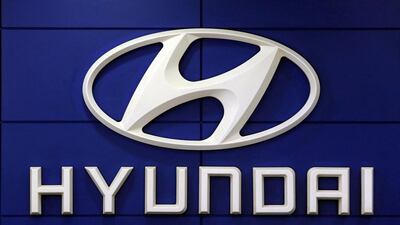South Korean auto maker Hyundai denied it is in talks with Apple on autonomous electric cars, a month after it confirmed early-stage discussion with the iPhone manufacturer, sending its shares skidding.
In a regulatory filing on the Korea Exchange, Hyundai said it wanted to clarify "rumours" about a joint effort between its affiliate Kia Motors and Apple.
The company said it received proposals from a number of foreign companies to jointly develop self-driving electric vehicles but nothing has been finalised yet.
"We are not conducting consultations with Apple on the development of autonomous vehicles," Hyung-geun Bae, the company’s director and head of finance, said.
"We are considering additional cooperation with a number of overseas companies regarding the autonomous electric vehicle business … but this has not been decided yet," he added.
Shares of Hyundai and Kia fell 4.4 per cent and 12.2 per cent, respectively, in Seoul trading following the filing.
Reports emerged in December that Apple plans to produce its first EV by 2024.
On January 8, Hyundai said it was in early talks with Apple, sending its stocks up nearly 20 per cent. Kia's shares jumped more than 60 per cent on the news as well. A report last week by DongA Ilbo said Kia would receive an investment of $3.6 billion from Apple to make EVs, sending its stock up 10 per cent.
Apple secretly began its automated and EVs development – known as Project Titan – in 2014, according to Reuters. The company has yet to publicly discuss any of its automobile goals, but nearly 5,000 engineers and scientists have been working on the project since 2018.
The company faces stiff competition in the electric car market from dedicated EV maker Tesla as well as automotive giants like Audi, BMW, Volkswagen and General Motors.
The Covid-19 pandemic has increased the focus on making the car industry greener.
Kia, which is South Korea's second-largest automobile manufacturer after parent company Hyundai, will invest $26bn by 2025 on developing its own EV and self-driving technology. It aims to sell more than 500,000 EVs a year by 2026 and 800,000 in next 10 years.
Specs
Engine: Electric motor generating 54.2kWh (Cooper SE and Aceman SE), 64.6kW (Countryman All4 SE)
Power: 218hp (Cooper and Aceman), 313hp (Countryman)
Torque: 330Nm (Cooper and Aceman), 494Nm (Countryman)
On sale: Now
Price: From Dh158,000 (Cooper), Dh168,000 (Aceman), Dh190,000 (Countryman)
AS%20WE%20EXIST
%3Cp%3EAuthor%3A%20Kaoutar%20Harchi%C2%A0%3C%2Fp%3E%0A%3Cp%3EPublisher%3A%20Other%20Press%3C%2Fp%3E%0A%3Cp%3EPages%3A%20176%3C%2Fp%3E%0A%3Cp%3EAvailable%3A%20Now%3C%2Fp%3E%0A
The specs
Engine: 2.0-litre 4-cyl
Power: 153hp at 6,000rpm
Torque: 200Nm at 4,000rpm
Transmission: 6-speed auto
Price: Dh99,000
On sale: now
THE BIO: Martin Van Almsick
Hometown: Cologne, Germany
Family: Wife Hanan Ahmed and their three children, Marrah (23), Tibijan (19), Amon (13)
Favourite dessert: Umm Ali with dark camel milk chocolate flakes
Favourite hobby: Football
Breakfast routine: a tall glass of camel milk
The Settlers
Director: Louis Theroux
Starring: Daniella Weiss, Ari Abramowitz
Rating: 5/5
White hydrogen: Naturally occurring hydrogen
Chromite: Hard, metallic mineral containing iron oxide and chromium oxide
Ultramafic rocks: Dark-coloured rocks rich in magnesium or iron with very low silica content
Ophiolite: A section of the earth’s crust, which is oceanic in nature that has since been uplifted and exposed on land
Olivine: A commonly occurring magnesium iron silicate mineral that derives its name for its olive-green yellow-green colour
German intelligence warnings
- 2002: "Hezbollah supporters feared becoming a target of security services because of the effects of [9/11] ... discussions on Hezbollah policy moved from mosques into smaller circles in private homes." Supporters in Germany: 800
- 2013: "Financial and logistical support from Germany for Hezbollah in Lebanon supports the armed struggle against Israel ... Hezbollah supporters in Germany hold back from actions that would gain publicity." Supporters in Germany: 950
- 2023: "It must be reckoned with that Hezbollah will continue to plan terrorist actions outside the Middle East against Israel or Israeli interests." Supporters in Germany: 1,250
Source: Federal Office for the Protection of the Constitution
THE%20SPECS
%3Cp%3EEngine%3A%203-litre%20V6%20turbo%20(standard%20model%2C%20E-hybrid)%3B%204-litre%20V8%20biturbo%20(S)%0D%3Cbr%3EPower%3A%20350hp%20(standard)%3B%20463hp%20(E-hybrid)%3B%20467hp%20(S)%0D%3Cbr%3ETorque%3A%20500Nm%20(standard)%3B%20650Nm%20(E-hybrid)%3B%20600Nm%20(S)%0D%0D%3Cbr%3EPrice%3A%20From%20Dh368%2C500%0D%3Cbr%3EOn%20sale%3A%20Now%3C%2Fp%3E%0A
Paatal Lok season two
Directors: Avinash Arun, Prosit Roy
Stars: Jaideep Ahlawat, Ishwak Singh, Lc Sekhose, Merenla Imsong
Rating: 4.5/5
TECH%20SPECS%3A%20APPLE%20WATCH%20SERIES%209
%3Cp%3E%3Cstrong%3EDisplay%3A%3C%2Fstrong%3E%2041mm%20%E2%80%93%20352%20x%20430%3B%2045mm%20%E2%80%93%20396%20x%20484%3B%20always-on%20Retina%20LTPO%20OLED%2C%202000%20nits%20max%3B%20Ion-X%20glass%20(aluminium%20cases)%2C%20sapphire%20crystal%20(stainless%20steel%20cases)%3C%2Fp%3E%0A%3Cp%3E%3Cstrong%3EProcessor%3A%3C%2Fstrong%3E%20Apple%20S9%2064-bit%2C%20W3%20wireless%2C%202nd-gen%20Ultra%20Wideband%3C%2Fp%3E%0A%3Cp%3E%3Cstrong%3ECapacity%3A%3C%2Fstrong%3E%2064GB%3C%2Fp%3E%0A%3Cp%3E%3Cstrong%3EMemory%3A%3C%2Fstrong%3E%201GB%3C%2Fp%3E%0A%3Cp%3E%3Cstrong%3EPlatform%3A%3C%2Fstrong%3E%20watchOS%2010%3C%2Fp%3E%0A%3Cp%3E%3Cstrong%3EHealth%20metrics%3A%3C%2Fstrong%3E%20Blood%20oxygen%20sensor%2C%20electrical%20heart%20sensor%20and%20ECG%2C%203rd-gen%20optical%20heart%20sensor%2C%20high%20and%20low%20heart%20rate%20notifications%2C%20irregular%20rhythm%20notifications%2C%20sleep%20stages%2C%20temperature%20sensing%3C%2Fp%3E%0A%3Cp%3E%3Cstrong%3EEmergency%20services%3A%3C%2Fstrong%3E%20Emergency%20SOS%2C%20international%20emergency%20calling%2C%20crash%20detection%2C%20fall%20detection%3C%2Fp%3E%0A%3Cp%3E%3Cstrong%3EConnectivity%3A%3C%2Fstrong%3E%20GPS%2FGPS%20%2B%20cellular%3B%20Wi-Fi%2C%20LTE%2C%20Bluetooth%205.3%2C%20NFC%20(Apple%20Pay)%3C%2Fp%3E%0A%3Cp%3E%3Cstrong%3EDurability%3A%3C%2Fstrong%3E%20IP6X%2C%20water%20resistant%20up%20to%2050m%2C%20dust%20resistant%3C%2Fp%3E%0A%3Cp%3E%3Cstrong%3EBattery%3A%3C%2Fstrong%3E%20308mAh%20Li-ion%2C%20up%20to%2018h%20regular%2F36h%20low%20power%3B%20wireless%20charging%3C%2Fp%3E%0A%3Cp%3E%3Cstrong%3ECards%3A%3C%2Fstrong%3E%20eSIM%3C%2Fp%3E%0A%3Cp%3E%3Cstrong%3EFinishes%3A%3C%2Fstrong%3E%20Aluminium%20%E2%80%93%20midnight%2C%20pink%2C%20Product%20Red%2C%20silver%2C%20starlight%3B%20stainless%20steel%20%E2%80%93%20gold%2C%20graphite%2C%20silver%3C%2Fp%3E%0A%3Cp%3E%3Cstrong%3EIn%20the%20box%3A%3C%2Fstrong%3E%20Watch%20Series%209%2C%20woven%20magnetic-to-USB-C%20charging%20cable%2C%20band%2Floop%3C%2Fp%3E%0A%3Cp%3E%3Cstrong%3EPrice%3A%3C%2Fstrong%3E%20Starts%20at%20Dh1%2C599%20(41mm)%20%2F%20Dh1%2C719%20(45mm)%3C%2Fp%3E%0A
Results
5.30pm: Maiden (TB) Dh82,500 (Dirt) 1,600m, Winner: Panadol, Mickael Barzalona (jockey), Salem bin Ghadayer (trainer)
6.05pm: Maiden (TB) Dh82,500 (Turf) 1,400m, Winner: Mayehaab, Adrie de Vries, Fawzi Nass
6.40pm: Handicap (TB) Dh85,000 (D) 1,600m, Winner: Monoski, Mickael Barzalona, Salem bin Ghadayer
7.15pm: Handicap (TB) Dh102,500 (T) 1,800m, Winner: Eastern World, Royston Ffrench, Charlie Appleby
7.50pm: Handicap (TB) Dh92,500 (D) 1,200m, Winner: Madkal, Adrie de Vries, Fawzi Nass
8.25pm: Handicap (TB) Dh92,500 (T) 1,200m, Winner: Taneen, Dane O’Neill, Musabah Al Muhairi
Gothia Cup 2025
4,872 matches
1,942 teams
116 pitches
76 nations
26 UAE teams
15 Lebanese teams
2 Kuwaiti teams
Nayanthara: Beyond The Fairy Tale
Starring: Nayanthara, Vignesh Shivan, Radhika Sarathkumar, Nagarjuna Akkineni
Director: Amith Krishnan
Rating: 3.5/5
Sholto Byrnes on Myanmar politics
What are the influencer academy modules?
- Mastery of audio-visual content creation.
- Cinematography, shots and movement.
- All aspects of post-production.
- Emerging technologies and VFX with AI and CGI.
- Understanding of marketing objectives and audience engagement.
- Tourism industry knowledge.
- Professional ethics.
Fifa Club World Cup quarter-final
Kashima Antlers 3 (Nagaki 49’, Serginho 69’, Abe 84’)
Guadalajara 2 (Zaldivar 03’, Pulido 90')
More from Neighbourhood Watch:


